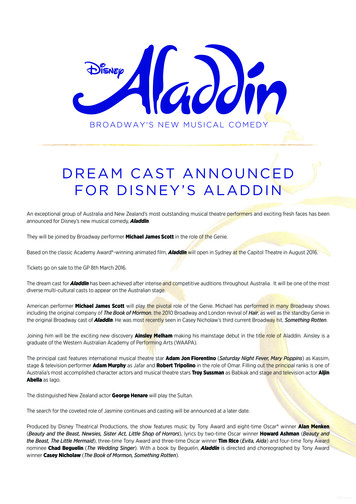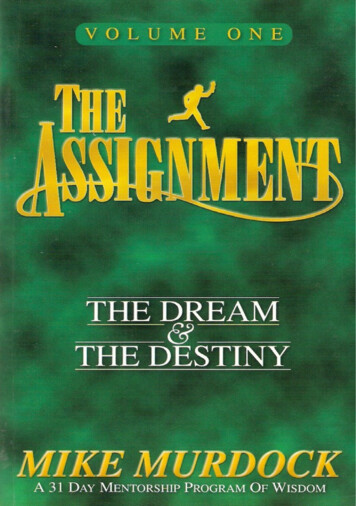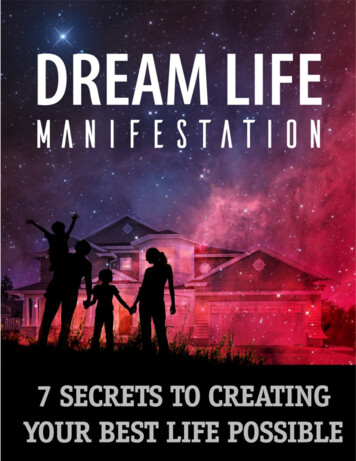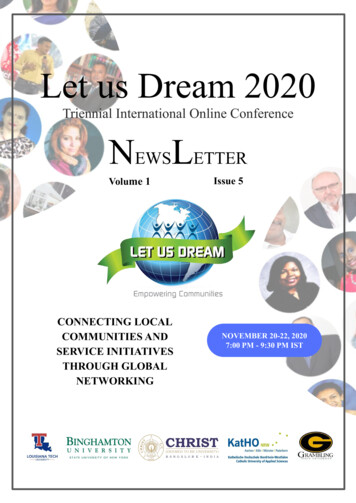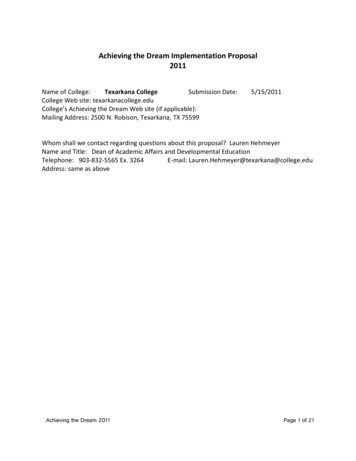
Transcription
Page 1 of 109A MIDSUMMER NIGHT’S DREAMWILLIAM SHAKESPEAREPERFORMED IN THE ORIGINAL PRONUNCIATIONUNIVERSITY OF KANSASNOVEMBER 11-21, 2010DIRECTOR: PAUL MEIERINTRODUCTIONI first encountered the idea of Original Pronunciation in 2005 when I read David Crystal’s Pronouncing Shakespeare. This is hisaccount of the OP experiment at Shakespeare’s Globe’s in 2004 in which just one weekend out of the entire run of Romeo and Julietwas devoted to performances in the dialect. David was retained by the company to guide them in this bold project, and again thefollowing year when the company produced Troilus and Cressida, this time more boldly devoting the entire run to OP.When I read about this very rare, but highly successful experiment (prior to his production Crystal knew only of John Barton’s JuliusCaesar at Cambridge in the 1950s as a precedent in living memory) I was very keen to engage in this research myself. I invited Davidto give an OP workshop to the group of American acting students I took to Stratford-upon-Avon in June, 2007. His workshop was ahuge hit, and only confirmed my enthusiasm to direct an OP production. I proposed a production of A Midsummer Night’s Dream tothe University Theatre at the University of Kansas, where I am the voice, speech, dialect and heightened text specialist on the faculty.My proposal included a two week residency by David to coach the cast. Thanks to funding by KU’s upper administration, he wasengaged for this purpose, and to deliver a range of talks university-wide on the many linguistic topics for which he is famous.Prior to his visit we decided to transcribe the play using phonetic symbols to show the differences in pronunciation between EarlyModern and Modern English, and to produce recordings to guide the cast. The document you are reading now is what the cast used.We used both the ordinary and the phonetic alphabets, thus avoiding redundant detail, and making it easier for actors not familiar withthe International Phonetic Alphabet (about half the company). IPA phonetic symbols are colored in red to distinguish them fromordinary Roman letters.
Page 2 of 109Since the actors in this production were all Americans, and mid-Westerners to boot, and already used post-vocalic r-coloration in theirown speech, indications of that feature were omitted (for example, burn was transcribed as ‘bɐrn’ rather than ‘bɐ n’). Other features(e.g. the [ɑ] pronunciation of the THOUGHT and LOT lexical sets) that today’s mid-Western American English shares with the EarlyModern English of Shakespeare’s day, were also largely omitted. David’s uncut version will vary somewhat from this transcriptionconvention.You will see some differences in transcription style for high and low characters, and for formal versus informal speech. For example,h-dropping was variable in Shakespeare’s time, as was the reduction of unstressed –ing endings. So rehearsing might be spoken byone character in one context as rehɐrsing and re’ɐrsin’ in another. In Pyramus and Thisbe, the mechanicals’ speech reflects theirattempt to adopt a high style of diction.I produced and listed several other aids for the company and for others who are tempted to try an OP production: My online interactive IPA charts, at http://www.paulmeier.com/ipa/charts.html. An OP dialect tutorial in eBook form, based on David’s analysis, and with his oversight, with both text and embedded soundfiles, online at http://paulmeier.com/OP.pdf. David may be heard speaking in the dialect at his Website, http://www.pronouncingshakespeare.com/. My eBook, Voicing Shakespeare; I gave the cast subscriptions to this. It’s available at http://paulmeier.com/shakespeare.html I extracted my Top Ten Tips from Voicing Shakespeare and embedded a sound file in that document. It’s freely available athttp://paulmeier.com/DREAM/Top Ten Tips.pdf Two actors from David’s Troilus and Cressida cast can be heard in OP on this Signum Records 2-CD usic/this-world s-globe/sigcd077.html.Two students who came with me to Stratford in 2007, Amy Virginia Buchanan and Chris McGillivray, shared the transcription taskwith me; David Crystal guided and corrected our work. Click the links to hear him speak the text. Since this was meant to guide onlythe actors’ pronunciation rather than their performance, his reading is deliberately flat and without interpretation. However, since heis skilled in Shakespeare’s verse, his transcription and reading are metrically observant and are excellent guides to the speaking in thatregard. Notice, for instance, the difference between strong and weak forms; for example, I appears as [a], [əi], or [ə] depending on itsmetrical context.
Page 3 of 109I produced this edition after careful comparison of several others; my performance cuts are indicated by the use of strike-through.David is planning a full version, with all cuts restored, and following his established transcription convention without color-coding. Itwill be available at his Website: http://www.pronouncingshakespeare.com/.The stage production was recorded in high-definition video and a DVD is available. I further cut the text and adapted it for radio, andthe original cast recorded this radio drama version immediately following the close of the stage production; it is available as an mp3download. For details of these, see http://paulmeier.com/shakespeare.html.Finally I must pay tribute to my wonderful company. It was a truly joyous collaboration, one that I shall never forget.The company was as follows:DIRECTORMUSICAL DIRECTOR/COMPOSERCHOREOGRAPHERSCENIC AND LIGHTING DESIGNERCOSTUME DESIGNERSOUND DESIGNERDIALECT COACHESMAKEUP DESIGNERSPaul MeierRyan McCallLeslie BennettDelbert UnruhDennis ChristillesErin TomkinsDavid Crystal, Paul MeierPhillip Schroder, Tammy AEGEUSPHILOSTRATEOBERONTITANIAMatt GieschenClaire VowelsAustin RobinsonBen SullivanHannah RoarkLynsey BecherFestus ShaughnessyTroy Clifford DarginJohn Staniunas *Leslie Bennett *
Page 4 of 109DRAGONSNAP - A FAIRYPEASEBLOSSOMCOBWEBMOTHMUSTARDSEEDPUCKPETER QUINCENICK BOTTOMFRANCIS FLUTETOM SNOUTSNUGROBIN STARVELINGUNDERSTUDY TO TITANIAJennifer WalkerMary McNultyHailey LapinSara KennedyMargaret HanzlickJ.T. NagleGarrett LawsonScott CoxRyan LuedersCharlie StockJames TellerSam VoelkerMary McNulty*GUEST FACULTY ARTISTSPaul MeierUniversity of KansasDecember, 2010
Page 5 of 109David Crystal speaks this scene at:http://paulmeier.com/DREAM/dream1 1.mp3David Crystal speaks this scene at:http://paulmeier.com/DREAM/dream1 1.mp3ACT IACT ISCENE I. Athens. The palace of THESEUS.SCENE I. Athens. The palace of THESEUS.Enter THESEUS, HIPPOLYTA, PHILOSTRATE, and AttendantsTHESEUSNow, fair Hippolyta, our nuptial hourDraws on apace; four happy days bring inAnother moon: but, O, methinks, how slowThis old moon wanes! she lingers my desires,Like to a step-dame or a dowagerLong with’ring out a young man’s revenue.HIPPOLYTAFour days will quickly steep themselves in night;Four nights will quickly dream away the time;And then the moon, like to a silver bowNew-bent in heaven, shall behold the nightOf our solemnities.THESEUSGo, Philostrate,Stir up th’Athenian youth to merriments;Awake the pert and nimble spirit of mirth;Turn melancholy forth to funerals;The pale companion is not for our pomp.Enter THESEUS, HIPPOLYTA, PHILOSTRATE, and AttendantsTHESEUSNəʊ, fɛːr Hippolyta, or nɤpsial oːrDraws on apɛːce; foːr happəɪ dɛːys bring inAnoːther moon: bɤt, oː, mɪthinks, ‘əʊ sloːwThis oːld moon wɛːnes! shɪ lingers məɪ desəires,Ləike to a step-dɛːme or a dəʊagerLong with’rin' əʊt a yɤng man’s revenue.HIPPOLYTAFoːr dɛːys will quickləi steːp themselves in nəight;Foːr nəights will quickləi dreːm awɛːy the təime;And then the moon, ləike to a silver boːwNew-bent in heaven, shɒll bɪ’oːld the nəightOf oːr solemnitəis.THESEUSGoː Philostrɛːte,Stɐr ɤp th' Ateːnian youth tə merriments;Awɛːke the pɐrt and nimble sprəit ə mɐrth;Tɐrn melancholəi foːrth tə funerals;The pɛːle companion is not foːr or pomp.Exit PHILOSTRATEExit PHILOSTRATE
Page 6 of 109Hippolyta, I woo'd thee with my sword,And won thy love, doing thee injuries;But I will wed thee in another key,With pomp, with triumph and with revelling.Hippolyta, ə woo'd thɪ with mɪ swoːrd,And wɤn thɪ lɤve, doin’ thɪ injurəis;But əi will wed thɪ in anoːther keːy,With pomp, with trəiɤmph and with revellin’.Enter EGEUS, HERMIA, LYSANDER, and DEMETRIUSEnter EGEUS, HERMIA, LYSANDER, and DEMETRIUSEGEUSHappy be Theseus, our renownèd duke!THESEUSThanks, good Egeus: what's the news with thee?EGEUSFull of vexation come I, with complaintAgainst my child, my daughter Hermia.Stand forth, Demetrius. My noble lord,This man hath my consent to marry her.Stand forth, Lysander: and my gracious duke,This man hath bewitch'd the bosom of my child;Thou, thou, Lysander, thou hast giv’n her rhymes,And interchang’d love-tokens with my child:Thou hast by moonlight at her window sung,With feigning voice, verses of feigning love,And stol’n the impression of her fantasyWith bracelets of thy hair, rings, gawds, conceits,Knacks, trifles, nosegays, sweetmeats, messengersOf strong prevailment in unharden'd youth:With cunning hast thou filch'd my daughter's heart,Turn'd her obedience, which is due to me,To stubborn harshness: and, my gracious duke,Be it so she will not here before your graceConsent to marry with Demetrius,EGEUSHappəi bɪ Theːseus, oːr renəʊwnɪd duke!THESEUSThanks, good Egeːus: hwat's the news wi’ theː?EGEUSFull ə vexɛːsjən cɤme əi, with complɛːntAgɛnst mɪ chəild, mɪ daːghter Hɐrmia.Stand foːrth, Demeːtrius. Mɪ noːble loːrd,This man ‘əth məi consent tə marrəi hɐr.Stand foːrth, Lɪzander: and mɪ grɛːsjəs duke,This man ‘əth b’witch'd the bosom of mɪ chəild;Thəʊ, thəʊ, Lɪzander, thəʊ ‘əst giv’n ‘er rhəimes,ənd interchɛːng’d lɤve-to:kens with mɪ chəild:Thəʊ hast bɪ moonləight at ‘er wində sɤng,Wi’ fɛːgnin’ vəice, vɐrses ə fɛːgnin’ lɤve,ən’ sto:l’n th’ impresjən of ‘er fantasəiWi’ brɛːcelets of thɪ hɛːr, rings, gawds, conceːts,Knacks, trəifles, nosegɛːys, sweːtmeːts, messengɐrsOf strong prevɛːlment in ɤnharden'd youth:With cɤnnin’ hast thəʊ filch'd mɪ daːghter's hart,Tɐrn'd her obeːdience, hwich is due tə meː,Tə stɤbborn harshnɪss: and, mɪ grɛːsjous duke,Be:’t soː shɪ will not hi:re befo:re yər grɛːceConsent tə marrəi with Demeːtrius,
Page 7 of 109I beg the ancient privilege of Athens,As she is mine, I may dispose of her:Which shall be either to this gentlemanOr to her death, according to our lawImmediately provided in that case.THESEUSWhat say you, Hermia? be advised fair maid:To you your father should be as a god;One that composed your beauties, yea, and oneTo whom you are but as a form in waxBy him imprinted and within his powerTo leave the figure or disfigure it.Demetrius is a worthy gentleman.HERMIASo is Lysander.THESEUSIn himself he is;But in this kind, wanting your father's voice,The other must be held the worthier.HERMIAI would my father look'd but with my eyes.THESEUSRather your eyes must with his judgment look.HERMIAI do entreat your grace to pardon me.I know not by what power I am made bold,Nor how it may concern my modesty,In such a presence here to plead my thoughts;But I beseech your grace that I may knowThe worst that may befall me in this case,If I refuse to wed Demetrius.ə beg the ɛːnsjent privilege of atens,As sheː is məine, ə mɛːy dispose of hɐr:hwich shɒll be ɛther to this gentlemanor to ‘er death, accordin’ to or lawImmeːdiateləi provəided in that cɛːse.THESEUShwat sɛːy yə, Hɐrmia? beː advəised fɛːr mɛːd:Tə you yər father should be as a god;o:ne that compoːsed yər beautəis, yɛː, ənd o:neTə whom you are but as a foːrm in waxBɪ him imprintɪd and within his po:rTo leːve the figjure oːr disfigjure it.Demeːtrius is a wɐrthəi gentleman.HERMIASoː is Lɪzander.THESEUSIn ‘imself ‘ɪ is;Bɤt in this kəind, wantin’ yər father's vəice,The oːther mɤs’ be held the wɐrthier.HERMIAə would mɪ father look'd but with məi əis.THESEUSRather your əis mus' with ‘is jɤdgment look.HERMIAə do ɪntreːt yər grɛːce tə pardon meː.ə knoːw not bəi hwat po:r əi am mɛːde boːld,Nər həʊ it mɛːy concɐrn mɪ modestəi,In sɤch a presence hi:re tə pleːd mɪ thoughts;But əi beseːch yər grɛːce thət əi mɛːy knoːwThe wɐrst that mɛːy befall mɪ in this cɛːse,If əi refuse tə wed Demeːtrius.
Page 8 of 109THESEUSEither to die the death or to abjureFor ever the society of men.Therefore, fair Hermia, question your desires;Know of your youth, examine well your blood,Whether, if you yield not to your father's choice,You can endure the liv’ry of a nun,For aye to be in shady cloister mew'd,To live a barren sister all your life,Chanting faint hymns to the cold fruitless moon.Thrice-bless’d be they that master so their blood,To undergo such maiden pilgrimage;But earthlier happy is the rose distill'd,Than that which with’ring on the virgin thornGrows, lives and dies in single blessedness.HERMIASo will I grow, so live, so die, my lord,Ere I will yield my virgin patent upUnto his lordship, whose unwishèd yokeMy soul consents not to give sovereignty.THESEUSTake time to pause; and, by the next new moon-The sealing-day betwixt my love and me,For everlasting bond of fellowship-Upon that day either prepare to dieFor disobedience to your father's will,Or else to wed Demetrius, as he would;Or on Diana's altar to protestFor aye austerity and single life.THESEUSɛther tə dəi the death or to abjureFor ever the socəietəi ə men.Thɛrefoːre, fɛr Hɐrmia, questjon yuːr desəires;Knoːw of yər youth, examine well yər blɤd,hwɛːr if yə yeːld not to yər father's chəice,Yə can endjuːre the liv’rəi of a nɤn,Fər əi to beː in shɛːdəi cləister mew'd,Tə live a barren sister all yər ləife,Chantin' fɛːnt hymns tə the coːld fruitlɪss moon.Thrəice-bless’d bɪ thɛː that master soː their blɤd,To ɤndergoː such mɛːden pilgrima:ge;But ɐrthlier happəi is the roːse distill'd,Than that hwich with’rin’ on the vɐrgin thoːrnGroːs, lives an’ dəis in single bles
I proposed a production of A Midsummer Night’s Dream to the University Theatre at the University of Kansas, where I am the voice, speech, dialect and heightened text specialist on the faculty. My proposal included a two week residency by David to coach the cast. Thanks to funding by KU’s upper administration, he was engaged for this purpose, and to deliver a range of talks university-wide .
